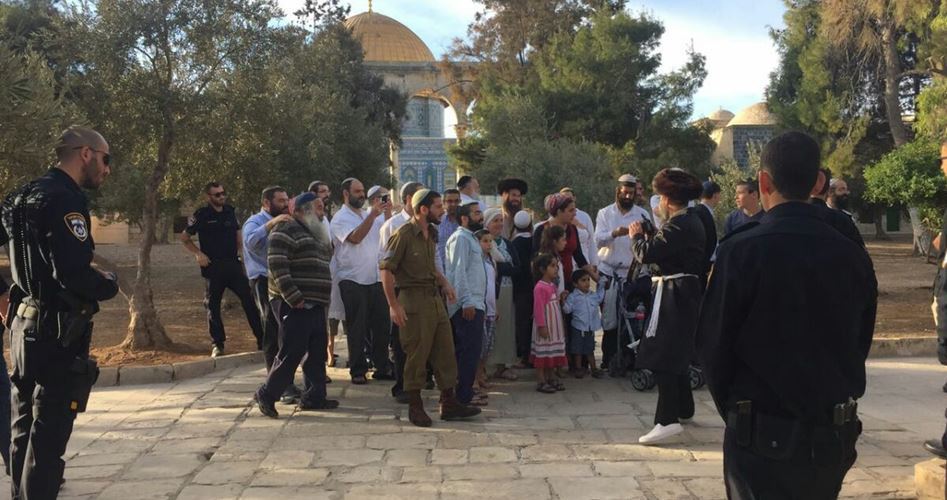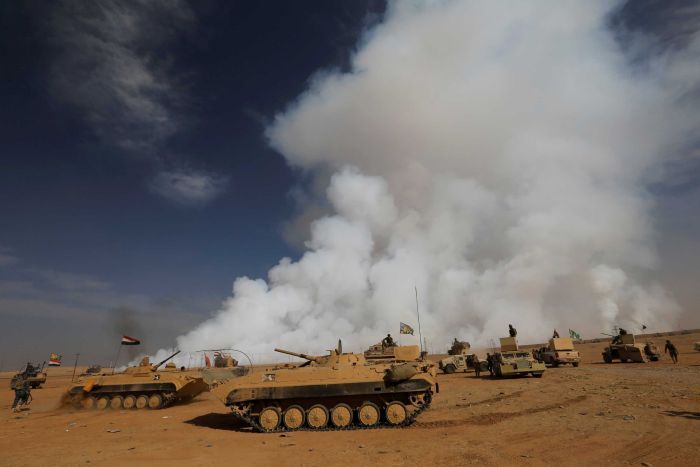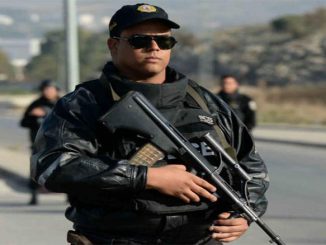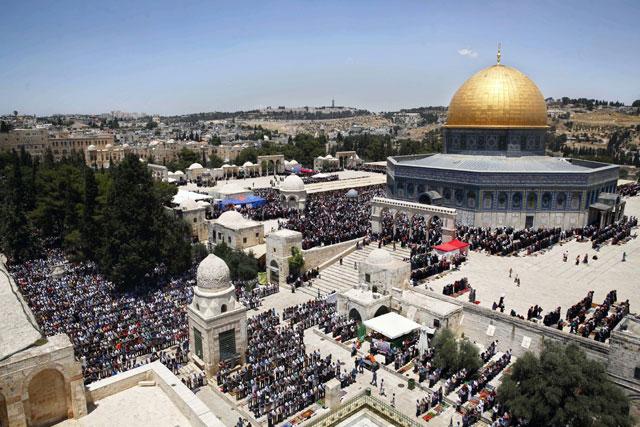
For the second day in a row, hundreds of Jewish settlers and Israeli forces on Wednesday forced their way into Jerusalem’s flashpoint Al-Aqsa Mosque compound to mark the Jewish holiday of Sukkot, according to Anadolu Agency.
“More than 300 settlers stormed the Al-Aqsa compound through Al-Mugharbeh gate under tight protection of Israeli forces since morning,” Sheikh Azzam al-Khatib, director-general of Al-Aqsa Affairs, told Anadolu Agency.
Jewish extremist groups have called on supporters to converge on Al-Aqsa compound this week to mark Sukkot, a week-long holiday, which started Sunday evening and will continue until the following Sunday.
According to al-Khatib, settlers tried to preform Talmudic rituals near Al-Qibali mosque and the Dome of the Rock before leaving the compound.
“Israeli police, meanwhile, have deployed hundreds of forces and erected roadblocks at the gates of Al-Aqsa compound,” he said.
Director of the Al-Aqsa Mosque compound Sheikh Omar al-Kiswani said that “a group of 206 Israeli settlers have raided Al-Aqsa Mosque since Tuesday morning, and toured Al-Aqsa under the protection of Israeli special forces and police,” one day after an estimated 43 Israelis also toured the compound.
Al-Kiswani added that Israeli police stationed at the gates of the compound seized Muslim worshipers’ identity cards before allowing them into the mosque.
He condemned Israeli actions at the compound, “including the tightened procedures imposed on Muslim worshipers while allowing the raids of Israeli settlers.”
Al-Kiswani called upon Muslims to “intensify their presence in Al-Aqsa Mosque to protect it from Israeli plans and daily raids.”
Eyewitnesses said that the Israeli tours in the compound were very “provocative,” saying that many Israelis tried to perform religious rituals in contravention of an agreement between Israel and the Islamic Endowment (Waqf) in charge of the Al-Aqsa Mosque compound which prohibits non-Muslim prayer at the site.
Al-Kiswani highlighted that some right-wing Jewish organizations had previously called on Israelis to visit the Al-Aqsa Mosque compound over the holidays, after they received assurances from the Israeli army that entry would be secured for every Jewish person wishing to visit the holy site.
Separately, according to Israeli media, Israeli authorities announced on Tuesday that they would be lifting general closures which had been imposed on all border crossings between the West Bank and Israel, and Israel and the Gaza Strip on Saturday night for the beginning of Sukkot.
An Israeli army spokesperson told Ma’an she would look into reports on the lifting of the closures and did not immediately provide additional information.
However, Israeli media reported that Israeli forces would be deployed in large numbers across Jerusalem, specifically occupied East Jerusalem’s Old City.
Several roads will also reportedly remain closed, including a main road linking East and West Jerusalem.
At the beginning of the month, scores of right-wing Israelis escorted by Israeli security forces toured the Al-Aqsa Mosque compound for the Jewish holiday of Rosh Hashanah.
Since the start of Rosh Hashanah, which marks the beginning of three successive Jewish holidays, Palestinian residents have experienced an increased presence of Israeli police in occupied East Jerusalem, including incursions of large groups of right-wing Israelis touring and attempting to pray on the compound.
Israeli forces also raided several homes in the Old City at the start of the holidays, detaining at least 15 Palestinians for several hours before releasing them and banning most of them from the Al-Aqsa Mosque compound.
Israeli forces also reportedly banned a number of Palestinian youth from entering the Al-Aqsa Mosque at the time. Palestinian youths who were permitted to enter Al-Aqsa also had their identity cards confiscated by Israeli forces stationed at the compound’s gates, eyewitnesses said.
Meanwhile, last week for the Jewish holiday of Yom Kippur, which follows Rosh Hashanah, a series of closures were implemented and heightened security operations were carried out throughout the West Bank, East Jerusalem, and the larger Jerusalem district.
Israeli police spokeswoman Luba al-Samri said in a statement at the start of Yom Kippur that Israeli police, border police, and Israeli “volunteers” would be spread throughout different areas in the city of Jerusalem beginning early Tuesday morning, the beginning of Yom Kippur, to “maintain order and provide protection for Jews expected to arrive to the Western Wall for prayer.”
Al-Samri added that Israeli police provided the volunteers with weapons to “guarantee the safety of the worshipers.”
The Al-Aqsa Mosque, which sits just above the Western Wall plaza, houses both the Dome of the Rock and the Al-Aqsa Mosque.
The third holiest site in Islam, it is also venerated as Judaism’s most holy place, as it sits where Jews believe the First and Second Temples once stood. The Second Temple was destroyed by the Romans in 70 AD.
While Jewish visitation is permitted to the compound, non-Muslim worship is prohibited according to an agreement signed between Israel and the Jordanian government after Israel’s illegal occupation of East Jerusalem in 1967.
Despite this agreement, the Israeli authorities regularly allow Jewish visitors to enter the site — often under armed guard. Such visits are typically made by right-wingers attempting to unsettle the status quo at the site, and coincide with restrictions on Palestinian access, including bans on entrance and detentions.
Tensions around the Al-Aqsa Mosque compound were a main contributor to the increasing unrest that began last October, after right-wing Israelis made frequent visits to the site during a succession of Jewish holidays this time last year.
For Muslims, Al-Aqsa represents the world’s third holiest site. Jews, for their part, refer to the area as the “Temple Mount,” claiming it was the site of two Jewish temples in ancient times.
On Tuesday, the executive board of the UN’s Educational, Scientific and Cultural Organization (UNESCO) officially adopted a resolution denying a Jewish connection to the Al-Aqsa Mosque compound.
The resolution called on Israel — as an “occupying power” — to restore of the “historic status quo” that prevailed until September 2000, under which the Jordan-run Organization for Muslim Endowments and Al-Aqsa Affairs exercised exclusive authority over the iconic mosque complex.
Israel occupied East Jerusalem — in which the Al-Aqsa is located — during the 1967 Middle East War. It formally annexed the entire city in 1980, claiming it as its capital — a move never recognized by the international community.



